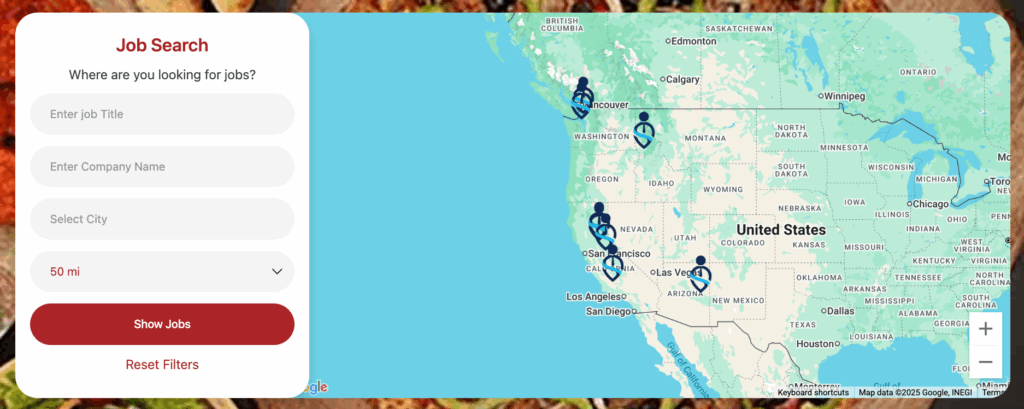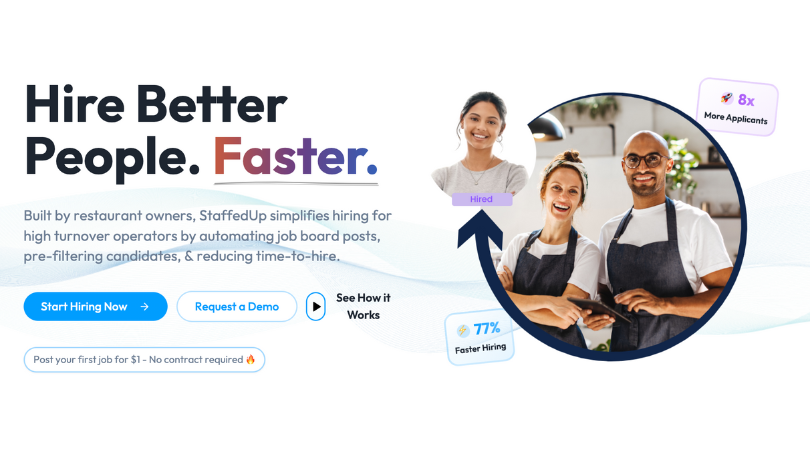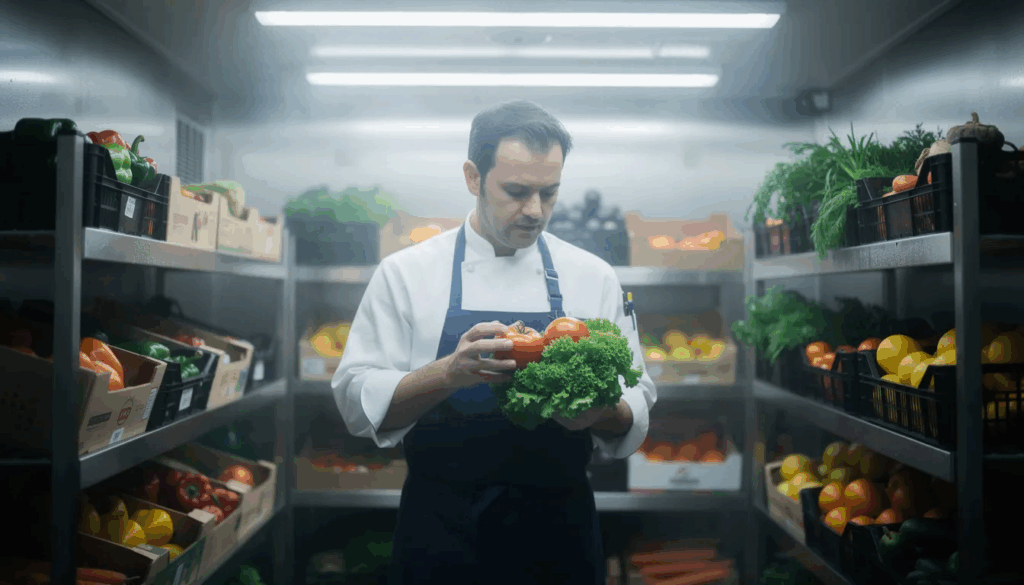Running one restaurant is demanding. Running five, ten, or fifty locations? That’s a whole different level of complexity.
From scheduling and inventory to HR, payroll, and hiring, franchise operators need more than hard work — they need smart systems that scale. That’s where restaurant franchise management software comes in.
In 2025, restaurant technology isn’t just about speed — it’s about integration, automation, and consistency across every location. And when hiring is one of your biggest challenges, tools like StaffedUp can help you manage people and processes with ease, while fitting seamlessly into your broader franchise software ecosystem.
This article breaks down what franchise management software is, why it’s crucial for restaurant groups, and how to build a tech stack that supports long-term growth and better hiring outcomes.

What Is Restaurant Franchise Management Software?
Restaurant franchise management software is a suite of digital tools designed to standardize and streamline operations across multiple locations.
It connects the moving parts of a franchise — HR, payroll, scheduling, inventory, compliance, and reporting — into a unified system.
Common features include:
- Centralized dashboards for tracking performance metrics
- Employee management tools for timekeeping and payroll
- Inventory tracking and cost controls
- Sales and reporting integration
- Hiring and onboarding automation
- Multi-location analytics and compliance management
The goal is simple: to give franchise owners and managers real-time visibility into operations, so every restaurant runs like your best location — not your busiest.
Why Franchise Software Is Essential for Restaurant Growth
As restaurant groups expand, manual processes quickly become unsustainable.
Consider these daily realities for multi-unit operators:
- Different locations use different spreadsheets.
- Managers manually share schedules through group texts.
- HR paperwork is inconsistent.
- Recruiting happens separately at each store.
This lack of standardization can lead to high turnover, poor communication, and inconsistent guest experiences — all of which impact profitability.
Franchise management software eliminates these barriers by creating a single source of truth for your team. With integrated systems, corporate leaders can monitor performance, ensure brand standards, and make faster, data-driven decisions.
The Core Pillars of Restaurant Franchise Management Software
To understand how the right tools help, let’s break down the essential functions every multi-unit operator should look for in a restaurant franchise management system.
Operations & Scheduling
Your operational backbone starts with scheduling and task management. Tools like 7shifts, HotSchedules, or When I Work help managers create schedules, track labor costs, and ensure labor compliance.
But scheduling only works when the right people are hired and trained — that’s why integrating hiring tools like StaffedUp creates a smooth handoff between onboarding and scheduling.
Payroll & Accounting
Consistent payroll is critical in multi-unit management. Platforms like Gusto, ADP, or Paycor automate payroll runs, handle tax filings, and reduce human error.
When connected to your franchise software, you can easily consolidate financial reporting and maintain compliance across every location.
Inventory & Supply Chain Management
Inventory tracking tools such as Restaurant365 or MarginEdge provide real-time cost analysis and reduce waste. These systems also connect with your POS data, helping operators forecast demand more accurately.
HR & Employee Management
From digital onboarding to performance reviews, HR software ensures consistency. Integrations between HR tools and applicant tracking systems (ATS) like StaffedUp make it easy to move new hires into your workforce management platform with one click — no manual entry or missed paperwork.
Hiring & Applicant Tracking
Hiring remains the number-one pain point for restaurant operators. That’s why your franchise tech stack should always include a reliable restaurant applicant tracking system.
StaffedUp was built specifically for hospitality operators — offering multi-location hiring dashboards, branded job pages, automated screening, and communication tools designed for busy restaurant environments.
When used alongside your scheduling, payroll, and HR systems, StaffedUp helps ensure you’re not just managing your workforce — you’re continually improving it.

How Hiring Fits into Franchise Management
You can’t manage what you don’t measure — and hiring is no exception.
Each franchise location might face different hiring challenges: seasonal volume, labor shortages, or retention struggles. But without centralized visibility, corporate leaders can’t identify patterns or make proactive decisions.
That’s where integrated hiring software makes the difference.
With StaffedUp’s multi-unit dashboard, franchise owners can:
- Monitor hiring performance across all locations.
- See which stores are struggling to fill key roles.
- View real-time applicant flow data.
- Standardize job templates and screening questions.
This level of insight helps you reduce turnover, maintain consistent brand standards, and ensure that every location is fully staffed — even during peak hours.
Example: A 10-unit restaurant group using StaffedUp reduced time-to-hire by 40% after implementing centralized hiring dashboards and standardizing their job templates across all stores.
Benefits of Using Restaurant Franchise Management Software
Let’s look at how these tools drive tangible results:
1. Improved Consistency
Brand consistency is everything in franchising. Centralized systems help ensure that guest experiences, employee onboarding, and performance standards remain identical across every location.
2. Better Visibility and Control
Executives and area managers can track KPIs in real-time — from labor costs to applicant flow — ensuring quick intervention before small issues become costly problems.
3. Time and Labor Savings
Automation frees up managers to focus on team development and guest experience instead of paperwork and manual data entry.
4. Enhanced Employee Retention
Integrated hiring and training tools lead to more qualified hires, faster onboarding, and higher job satisfaction.
5. Smarter Decision Making
Franchise software turns data into action. Operators can use historical data to forecast staffing needs, predict busy periods, and allocate resources effectively.
The Tech Stack Behind a Successful Franchise Operation
A modern restaurant franchise’s tech stack should be flexible, scalable, and interconnected.
Here’s an example of how a smart stack could look in 2025:
| Category | Example Tools | Function |
| Hiring & ATS | StaffedUp | Multi-location hiring, branded job pages, applicant tracking |
| Scheduling & Labor | 7shifts, HotSchedules | Shift management, labor compliance |
| Payroll & HR | Gusto, ADP | Pay processing, benefits, compliance |
| POS & Sales Data | Toast, Square | Transaction tracking, sales reports |
| Inventory | Restaurant365, MarginEdge | Food cost management, ordering |
| Communication | Slack, Beekeeper | Internal messaging, updates |
| Analytics | Tenzo, Avero | Data visualization and performance metrics |
The key is integration — ensuring that your systems talk to each other.
That’s one of the reasons operators choose StaffedUp: its hiring platform integrates easily with many of the industry’s top HR and scheduling tools, eliminating the gaps that slow down hiring and training.
Case Study: How StaffedUp Supported a Growing Franchise
A Midwest-based restaurant franchise group with 14 locations was struggling to keep pace with hiring demand. Each store used different job posting methods, and corporate leadership had no central visibility into who was applying, interviewing, or being hired.
After implementing StaffedUp across all locations, the brand achieved:
- A 38% increase in qualified applications
- Uniform hiring standards across every location
- Consistent candidate communication via automated emails and texts
- Integration with scheduling and payroll tools, simplifying onboarding
By centralizing their hiring process, they not only filled roles faster — they built a sustainable system that matched their franchise’s growth goals.
Takeaway: The right hiring software doesn’t just help you find people — it helps you run your franchise better.

Choosing the Right Franchise Software for Your Brand
Every restaurant brand is different. The best software for you depends on your operational size, goals, and budget.
Here are key questions to ask before choosing:
- Does it integrate with your current POS and HR tools?
- Can it scale as you add more locations?
- How intuitive is the user experience for store managers?
- Does it include mobile-friendly options for on-the-go management?
- What kind of customer support and onboarding is offered?
Franchise operators should look for solutions that simplify complexity — not add to it.
The Future of Franchise Management in 2025 and Beyond
The next wave of franchise management will focus on data intelligence and employee experience.
Artificial intelligence, predictive analytics, and smart automation are helping operators:
- Forecast staffing needs before shortages happen
- Identify top-performing locations based on hiring and retention data
- Personalize training and growth paths for employees
As franchise systems evolve, people-first technology will continue to lead — and that’s where hiring platforms like StaffedUp shine.
By helping operators attract, communicate with, and retain better candidates, StaffedUp doesn’t just fill positions — it strengthens your entire organization.
Final Thoughts
Successful franchise management depends on connected systems, consistent execution, and great people.
Restaurant franchise management software helps operators master the first two. Hiring software like StaffedUp ensures you never lose sight of the third.
When you combine them, you build a franchise that’s efficient, scalable, and ready for the next phase of growth.Want to see how your franchise could benefit from smarter hiring? Visit StaffedUp.com to explore solutions for multi-location hiring and team management.



